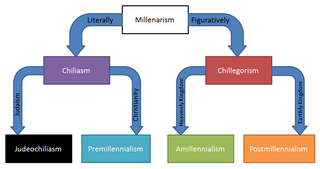Types
Difference in extent

Postmillennialists diverge on the extent of the gospel's conquest. The majority of postmillennialists do believe in an apostasy, and like B. B. Warfield, believe the apostasy refers to the Jewish people's rejection of Christianity either during the first century or possibly until the return of Christ at the end of the millennium. This postmillennial perspective essentially dovetails with the thinking of amillennial and premillennial schools of eschatology.
There is a minority of postmillennial scholars, however, who discount the idea of a final apostasy, regarding the gospel conquest ignited by the Great Commission to be total and absolute, such that no unsaved individuals will remain after the Spirit has been fully poured out on all flesh. This minority school, promoted by B. B. Warfield and supported by exegetical work of H.A.W. Meyer, [9] has started to gain more ground, even altering the thinking of some postmillennialists previously in the majority camp, such as Loraine Boettner [10] and R. J. Rushdoony. [11]
The appeal of the minority position, apart from its obvious gambit of taking key scriptures literally (John 12:32; Romans 11:25–26; Hebrews 10:13; Isaiah 2:4; 9:7; etc.), was voiced by Boettner himself after his shift in position: the majority-form of postmillennialism lacks a capstone, which Warfield's version does not fail to provide. Warfield also linked his views to an unusual understanding of Matthew 5:18, premised on Meyer's exegesis of the same passage, which presupposed a global conquest of the gospel in order for the supposed prophecy in that verse to be realized, [12] which inexorably leads to a literal fulfillment of the third petition of the Lord's Prayer: "Thy will be done on earth, as it is in heaven."
John Calvin's exposition of that part of the Lord's Prayer all but adopts the minority postmillennial position [13] but Calvin, and later Charles Spurgeon, were remarkably inconsistent on eschatological matters. Spurgeon delivered a sermon on Psalm 72 explicitly defending the form of absolute postmillennialism held by the minority camp today, but on other occasions he defended premillennialism. Moreover, given the nature of Warfield's views, [14] Warfield disdained the millennial labels, preferring the term "eschatological universalism" for the brand of postmillennialism now associated with his thinking.
Warfield, like those who follow in his footsteps, did not seek to support his doctrine of cosmic eschatology from Revelation 20, treating that passage (following Kliefoth, Duesterdieck, [15] and Milligan [16] ) as descriptive of the intermediate state and the contrast between church militant and triumphant. This tactic represented an abandonment of the Augustinian approach to the passage, [17] ostensibly justified by a perceived advance in taking the Book of Revelation's parallel passages to the little season of Satan more seriously (cf. Revelation 6:11 and 12:12).
Difference in means
Postmillennialists also diverge on the means of the gospel's conquest. Revivalist postmillennialism is a form of the doctrine held by the Puritans and some today that teaches that the millennium will come about not from Christians changing society from the top down (that is, through its political and legal institutions) but from the bottom up at the grass roots level (that is, through changing people's hearts and minds).
Reconstructionist postmillennialism, on the other hand, sees that along with grass roots preaching of the Gospel and explicitly Christian education, Christians should also set about changing society's legal and political institutions in accordance with Biblical, and also sometimes Theonomic, ethics (see Dominion theology). The revivalists deny that the same legal and political rules which applied to theocratic state of Ancient Israel should apply directly to modern societies which are no longer directly ruled by Israel's prophets, priests, and kings. In the United States, the most prominent and organized forms of postmillennialism are based on Christian Reconstructionism and hold to a reconstructionist form of postmillennialism advanced by R.J. Rushdoony, Gary North, Kenneth Gentry, and Greg Bahnsen.







